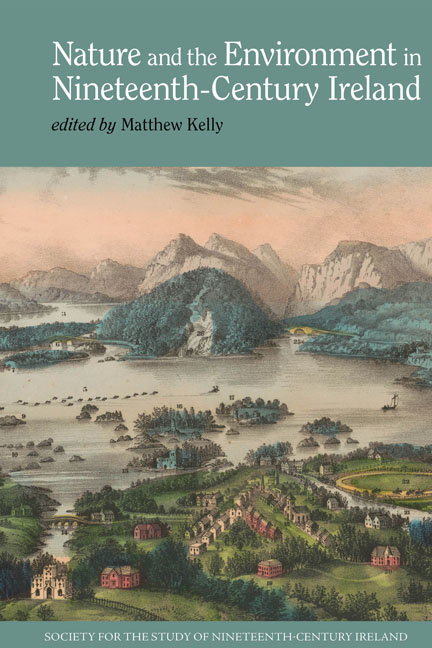Book contents
- Frontmatter
- Contents
- Acknowledgements
- List of Figures
- List of Tables
- List of Contributors
- Introduction
- 1 The Nature of Improvement in Ireland
- 2 Palmerston’s Conquest of Sligo
- 3 ‘A Voice for Ireland’: Isaac Butt, Environmental Justice, and the Dilemmas of the Irish Land Question
- 4 ‘In the Open Country’: Nature and the Environment during the ‘Monster’ Meeting Campaign of 1843
- 5 Therapeutic Environments in Nineteenth-Century Ireland: Hybrid Spaces and Practices
- 6 On Why the UK’s First National Park Might Have Been in Ireland
- 7 Towards an Environmental History of Nineteenth-Century Dublin
- 8 Mainstream or Tributary? The Question of ‘Hibernian’ Fishes in William Thompson’s The Natural History of Ireland (1849–56)
- 9 The Ocean of Truth: Atlantic Imagery in Emily Lawless’s Major Lawrence, F.L.S. (1885) and Grania: The Story of an Island (1892)
- 10 Seumas O’Sullivan and Revivalist Nature Poetry
- Index
5 - Therapeutic Environments in Nineteenth-Century Ireland: Hybrid Spaces and Practices
- Frontmatter
- Contents
- Acknowledgements
- List of Figures
- List of Tables
- List of Contributors
- Introduction
- 1 The Nature of Improvement in Ireland
- 2 Palmerston’s Conquest of Sligo
- 3 ‘A Voice for Ireland’: Isaac Butt, Environmental Justice, and the Dilemmas of the Irish Land Question
- 4 ‘In the Open Country’: Nature and the Environment during the ‘Monster’ Meeting Campaign of 1843
- 5 Therapeutic Environments in Nineteenth-Century Ireland: Hybrid Spaces and Practices
- 6 On Why the UK’s First National Park Might Have Been in Ireland
- 7 Towards an Environmental History of Nineteenth-Century Dublin
- 8 Mainstream or Tributary? The Question of ‘Hibernian’ Fishes in William Thompson’s The Natural History of Ireland (1849–56)
- 9 The Ocean of Truth: Atlantic Imagery in Emily Lawless’s Major Lawrence, F.L.S. (1885) and Grania: The Story of an Island (1892)
- 10 Seumas O’Sullivan and Revivalist Nature Poetry
- Index
Summary
Hybridity and Hydrotherapy
There were strong traditions in nineteenth-century Ireland that associated natural environments with aspects of health and healing. Global interest in the interactions of the environment with human health has traditionally focused on disease, especially infectious disease, as well as pollution and other elements of environmental justice. Within historical research carried out by medical/health geographers, there has been a surge of interest in healthy places, broadly described as ‘therapeutic landscapes’. Therapeutic landscapes have been defined as ‘a geographic metaphor for aiding in the understanding of how the healing process works itself out in places (or in situations, locales, settings, milieus)’. In Ireland and elsewhere, they have been studied as a range of different natural/built environments where particular healing practices and narratives shaped the cultural production of place. Equally, such spaces typically drew their healing reputations from specific environmental elements to be found locally. One especially important ingredient—water—and two specific forms of water-cure—spas and sweathouses— are the central focus of this chapter.
In considering such spaces and practices as hybrid, wherein blurred relations between nature and culture co-produce healing, we can frame them in relation to a number of multidisciplinary approaches including hybrid geographies, contemporary writing on nature-based health, and ‘new topographers’, whose work reflects a deeper mapping of well-being, place, and its human/non-human elements. Within writing on environmental history, Sutter and others reflect this new interest in hybridity as a means, in part, to ‘trouble’ nature as a singular category, preferring a hybrid direction ‘for approaches that see all environments as interweaving the natural and the cultural in complex ways’. Adelman and Ludlow's short introduction to Irish environmental history is equally built on the hybrid interplay of three core themes: how environments influence human societies, how humans change environments, and their associated attitudes to the environment. Foster and Chesney's first attempt at an environmental history of Ireland has less theoretical sophistication but equally draws from an interweaving of nature and culture to begin to understand how science, biology, and literature were all evident in how the Irish landscape was ‘written up’.
Water is an especially appropriate focus for historical studies of hybrid therapeutic environments.
- Type
- Chapter
- Information
- Nature and the Environment in Nineteenth-Century Ireland , pp. 96 - 117Publisher: Liverpool University PressPrint publication year: 2019



